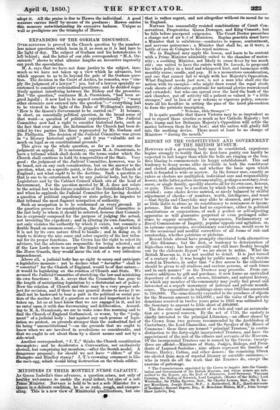EXPANDING OF THE 60RP - A If DISCUSSION.
OTER-RITEITESS is proved in the Church question by the number- less minor questions which teem in it as soon as it is laid bare to the light of day. The subject of Gorham and his heterodoxies is left behind ; and the letter of our able correspondent " M.A. Ox- oniensis" shows to what ulterior lengths an inventive ingenuity can push the speculation.
M. A. says that we have not done justice to the subject, inas- much as we have not taken up a view which he advances, but which appears to us to lie beyond the pale of the Gorham ques- tion. The decision in the Court of Arches, he remarks, was " sim- ply the judgment of a lawyer" : yes, but of a lawyer specially ac- customed to consider ecclesiastical questionsand. he decided nega- tively against interfering between the Bishop and the presentee. But "the question," continues M. A. Oxoniensis, "had been ar- _pied legally; it now had to be argued constitutionally" : "many other elements now entered into the question "—" everything had to be viewed in the light of the Duke of Wellington's inquiry, How is the Queen's Government to be carried on?' It became, in short, an essentially political question, in the broad sense of that word—a question of political expediency." The Judicial -Committee now had a right to consider historical facts, such as the fact that ever since the Reformation the Church had been di- vided by two parties like those represented by Mr. Gorham and Dr. Phillpotts. The decision of the Judicial Committee was given in "a literary historical spirit " • and it was "valuable not so much on legal as on constitutional grounds."
This gives up the whole question, so far as it concerns the
judgment on appeal. It is necessary, argues IL A. to lave a tribunal which shall decide on the terms under which the Church shall continue to hold its temporalities of the State. Very good : the judgment of the Judicial Committee, however, was to be based, not on any such consideration, but on the answer to the question, what, on a specific point, is the doctrine of the Church of England ; not what ovoid to be the doctrine. Such a question as that is one-to be entertained, not by any judicial lady, but by the. Legislature and by the Cabinet Council which sits at the head of Government. For the question.mooted by M. A. does not relate to the actual but to the future eondition of the Established Church ; and when he applauds the Judicial Committee for having .decided a question of political expediency or state policy, he imputes to _that tribunal the most flagrant usurpation of authority.
Such an usurpation is to be condemned on every ground. If the question presses for consideration, the.Judicial Committee is the last body to whom it should be.referred, because .that-Commit- lee is expressly composed for the purpose of judging the actual, not inventing the expedient; and in altering its own .function, it not only violates the authority by which it exists, but commits a "double fraud on common sense,—it grapples with a -subject which it is not by its own nature fitted to handle ; and in doing so, it tends to destroy the nice sense and sober capacity of the law tribu- nal for its proper functions. The Crown has the right to select its advisers, but the advisers are responsible for being selected; and if the Law Lords were to accept the Royal mandate to preside at the Horse Guards, they -would incur the risk of a very ridiculous impeachment.
Above all, a judicial body has no right to usurp and anticipate a legislative measure : yet to declare what " hereafter " shall be " essential" for the Church of England, would beef that nature— it would be legislating on the relation of Church and State. We -accused the Judicial Committee of stretching the law and mistaking its own functions : M. A. avers that the Committee has gone to the length of anticipating legislation by a dictatorial act of policy. isTow the relation of Church and State may be a very proper sub- ject for revision, and if there be any general desire to revise it we shall not be backward to bear a part in the political or social por- tion of the matter ; but if a question so vast and important is to be taken up, let us at least laiow that we are -engaged in it, and let -us enter upon it with due forewarning and deliberation. Accord- ing to M. A. Oxoniensis, we are to wake some fine morning and to find the Church -of England Gorhamized, or worse, by the "judg- ment " of a judicial body : but against any such process of legis- lation we protest, on grounds stronger than the undoubted fact of its being " unconstitutional "—on the grounds that we ought to know when we are involved in revolutions so considerable, and that we ought to set about -them by a direct means -and not by a side-wind.
Another correspondent, "J. T.," thinks the Church constitution incomplete ; and he desiderates a Convocation, not exclusively clerical, but comprising lay members,—after the Scotch model. A dangerous proposal ; for should we not have " elders " of the Plumptre and Hindley stamp ? I. T.'s crowning ornament is like the roc's egg, which would bring destruction on the whole edifice.


























 Previous page
Previous page